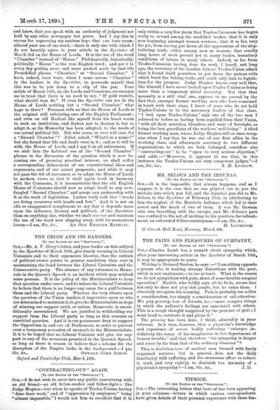"CONTRACTING-OUT " AGAIN.
[To TER EDITOR OF TIII "SPECTATOR."]
do not wish to enter into any public controversy with an old friend—an old fellow-worker and fellow-fighter like Judge Hughes—but when he speaks of Trades-Unions having "done their work," and of "oppression by employers" being "almost impossible," I would ask him to recollect that it is only within a very few years that Trades-Unionism has began really to extend among the unskilled trades; that it is only now beginning amongst women workers ; that it is far, very far yet, from having pat down all the oppressions of the slop- tailoring trade, either among men or women ; that cruelly long hours of work prevail yet in many trades, insanitary conditions of labour in many others. Indeed, so far from Trades-Unionism having done its work, I heard, not long ago, the secretary of the London Bakers' Trades-Union admit that it found itself powerless to put down the serious evils which beset the baking trade, and could only look to legisla- tion for the purpose. Judge Hughes knows very well that, like himself, I have never looked upon Trades-Unions as being more than a temporary social necessity. But that that necessity is a still vital one, appears to me proved by the fact that, amongst former working men who have remained in touch with their class, I know of none who do not hold Tritdes-Unions to be the necessary leaders of that class. " I look upon Trades-Unions," says one of the two men I referred to before as having been expelled from their Union, "with all their mistakes, blunders, and want of foresight, as being the best guardians of the workers' well-being." A third former working man, whom Judge Hughes will at once recog- nise when I say that he was one of our first allies in the working class, and afterwards secretary to two different organisations to which we both belonged, considers also " contracting-out " to be "open to very serious objection," and adds :—" Moreover, it appears to me that, in this instance, the Trades-Unions are very competent judges."—I


































 Previous page
Previous page